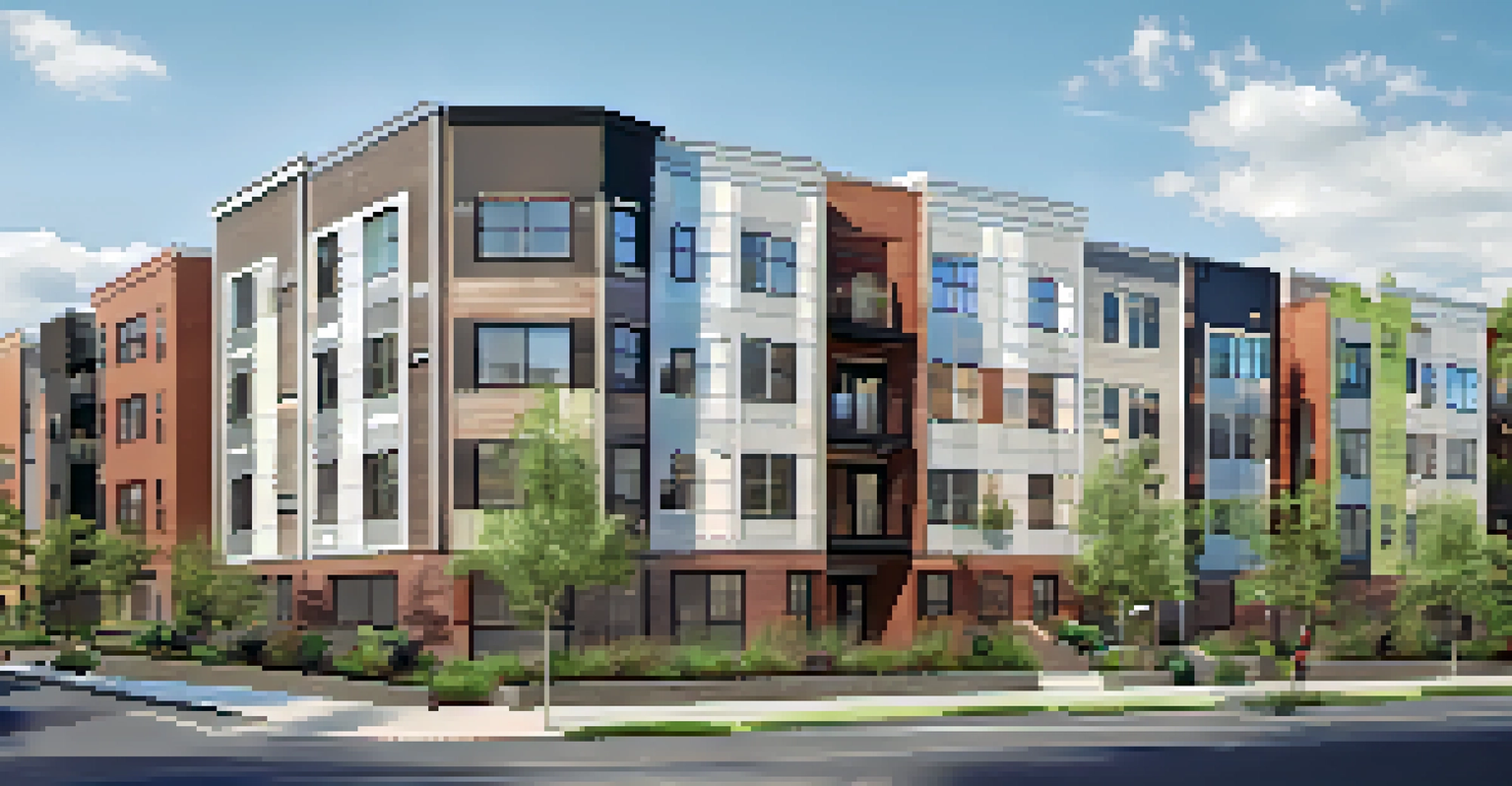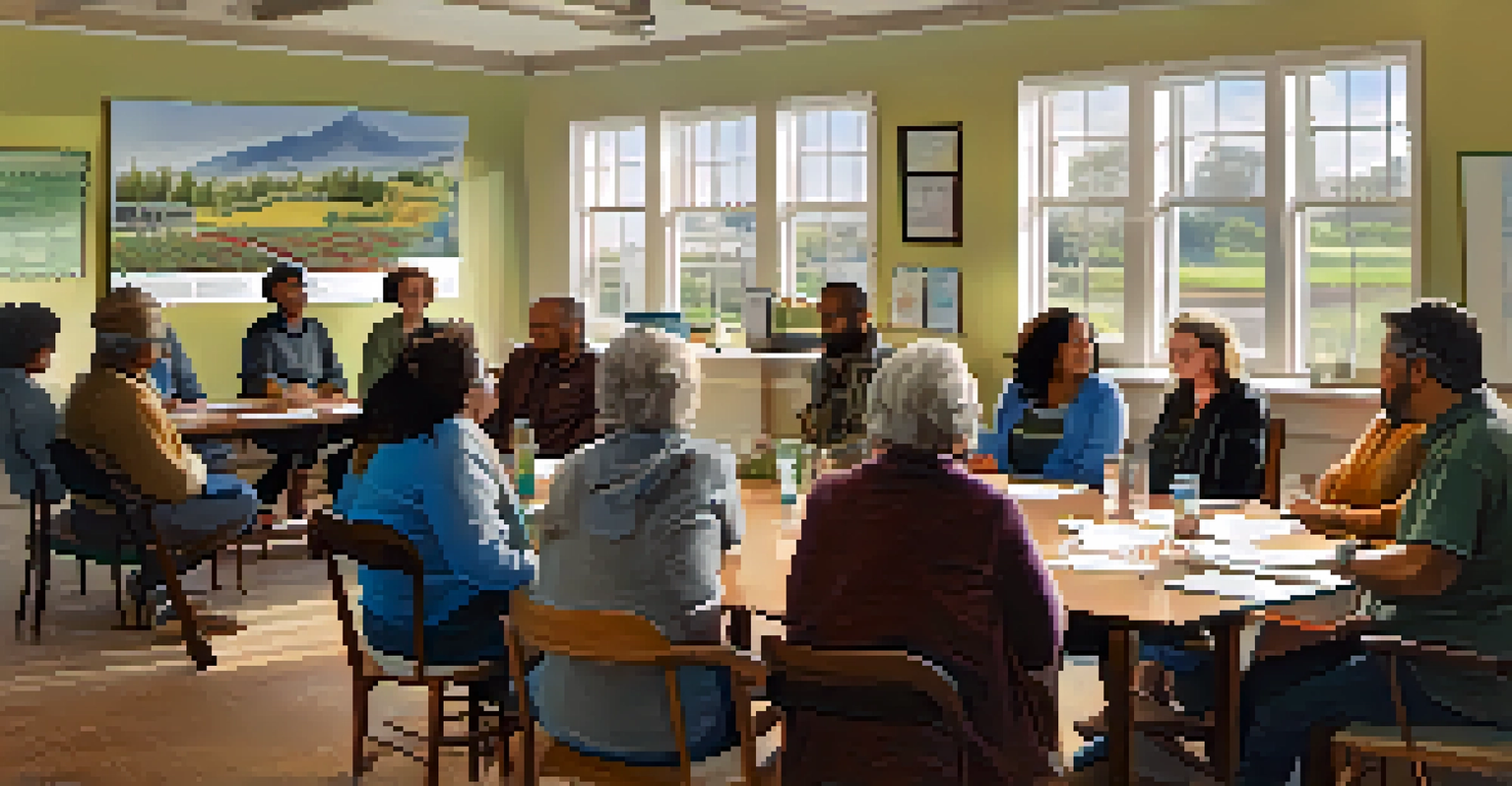Affordable Housing Initiatives in Jersey City: Community Focus

Understanding Affordable Housing in Jersey City
Affordable housing refers to housing that is reasonably priced for those with low to moderate incomes. In Jersey City, the rising cost of living has made it increasingly difficult for many residents to secure safe and stable homes. This issue highlights the need for effective initiatives to ensure everyone has access to affordable living options.
Affordable housing is a critical issue that affects the health and stability of our communities.
The city has been actively addressing this challenge by implementing various programs aimed at increasing the availability of affordable units. These initiatives not only focus on housing but also aim to improve the overall quality of life for community members. By fostering a diverse and inclusive environment, Jersey City seeks to support its residents in their quest for a stable home.
It's crucial to recognize that affordable housing is not just a policy issue—it's a community issue. When families are housed affordably, they can invest in their health, education, and overall well-being, creating a ripple effect that benefits the entire community.
Key Initiatives for Affordable Housing Development
One of the standout initiatives in Jersey City is the Affordable Housing Trust Fund, which allocates resources for the development of new affordable units. This fund supports projects that meet specific criteria, ensuring that new developments are not only affordable but also sustainable and community-oriented. By providing financial assistance, the city encourages developers to create more inclusive housing options.

Additionally, the city has adopted inclusionary zoning policies that require new residential developments to include a percentage of affordable units. This approach ensures that as the city grows, it does so in a way that benefits all residents, rather than just a select few. Inclusionary zoning helps to balance the housing market and promote socioeconomic diversity.
Community Engagement Drives Solutions
Jersey City actively involves residents in housing initiatives, ensuring their needs and preferences shape affordable housing strategies.
These initiatives, among others, demonstrate Jersey City's commitment to addressing the affordable housing crisis. By collaborating with developers, community organizations, and residents, the city aims to create a more equitable housing landscape for everyone.
Community Engagement in Housing Initiatives
Community engagement is a cornerstone of Jersey City's approach to affordable housing. The city regularly holds public meetings and forums to gather input from residents about their housing needs and preferences. This collaborative approach ensures that the initiatives developed are reflective of the community's desires and requirements.
The best way to predict the future is to create it.
By involving residents in the decision-making process, Jersey City empowers its citizens and fosters a sense of ownership over local housing initiatives. This participation not only enhances transparency but also builds trust between the city officials and the community. When residents feel heard, they are more likely to support and engage with the initiatives.
Moreover, community organizations play a vital role in advocating for affordable housing. They act as liaisons between residents and city officials, ensuring that the voices of the most vulnerable populations are amplified. This partnership strengthens the fabric of the community and helps to create a more inclusive housing strategy.
The Role of Nonprofits in Housing Solutions
Nonprofit organizations are pivotal in addressing affordable housing challenges in Jersey City. They often undertake the hard work of identifying housing needs, securing funding, and managing affordable housing projects. By focusing on community needs, these organizations fill gaps that may otherwise be overlooked by the market or government.
For instance, local nonprofits frequently collaborate with the city to develop affordable housing units that cater to specific demographics, such as families, seniors, or individuals with disabilities. This targeted approach ensures that the diverse needs of the community are met effectively. Nonprofits also provide vital support services, such as financial assistance and housing counseling, helping residents navigate their housing options.
Nonprofits Enhance Housing Efforts
Local nonprofit organizations play a crucial role in identifying needs and managing projects, addressing gaps in affordable housing.
The synergy between nonprofits and city initiatives is crucial in creating sustainable housing solutions. By working together, they can leverage resources and expertise to make a more significant impact on the community. Their collective efforts play a significant role in improving the quality of life for Jersey City residents.
Innovative Housing Models in Jersey City
Jersey City is exploring various innovative housing models to expand affordable options. One such model is the concept of community land trusts, which focuses on community ownership of land. This approach allows residents to purchase homes at affordable prices while ensuring long-term affordability and stability within the community.
Another exciting initiative is the development of mixed-income housing, where affordable units are integrated within market-rate developments. This strategy not only increases the number of affordable units available but also promotes diversity and a sense of community among residents of different income levels. By blending various income groups, these developments can foster social cohesion.
These innovative models challenge traditional housing paradigms and encourage creative solutions to the affordable housing crisis. By embracing new approaches, Jersey City is paving the way for a more inclusive and sustainable future.
Challenges Facing Jersey City's Affordable Housing Efforts
Despite the proactive measures taken, Jersey City still faces significant challenges in its pursuit of affordable housing. One major hurdle is the rising cost of construction and land, which can deter developers from pursuing affordable projects. This economic pressure often results in fewer units being created, exacerbating the housing crisis.
Additionally, there can be resistance from some community members who fear that affordable housing developments might negatively impact their neighborhoods. Addressing these concerns through education and communication is essential to building support for new projects. It's vital to highlight the benefits of affordable housing, such as increased economic activity and community revitalization.
Innovative Models for Affordable Housing
Jersey City is exploring innovative housing models like community land trusts and mixed-income developments to expand affordable options.
Overcoming these challenges requires a collaborative effort from all stakeholders involved. By fostering open dialogue and understanding, Jersey City can continue to make strides towards a more affordable and inclusive housing landscape.
The Future of Affordable Housing in Jersey City
Looking ahead, the future of affordable housing in Jersey City appears promising, thanks to the ongoing commitment from city officials and community members. With sustainable development practices and a focus on community needs, the city is well-positioned to continue expanding its affordable housing options. Future initiatives will likely incorporate even more innovative solutions to meet the diverse needs of residents.
Furthermore, as the city gains recognition for its affordable housing efforts, it may attract additional funding and partnerships with private developers and nonprofit organizations. This can enhance the capacity to create more affordable units and improve existing housing stock. Collaboration will be key in addressing the housing crisis effectively.

Ultimately, Jersey City aims to create a vibrant community where everyone has access to safe, affordable housing. By remaining focused on community-driven solutions and fostering inclusive practices, the city is taking significant steps towards a brighter housing future.